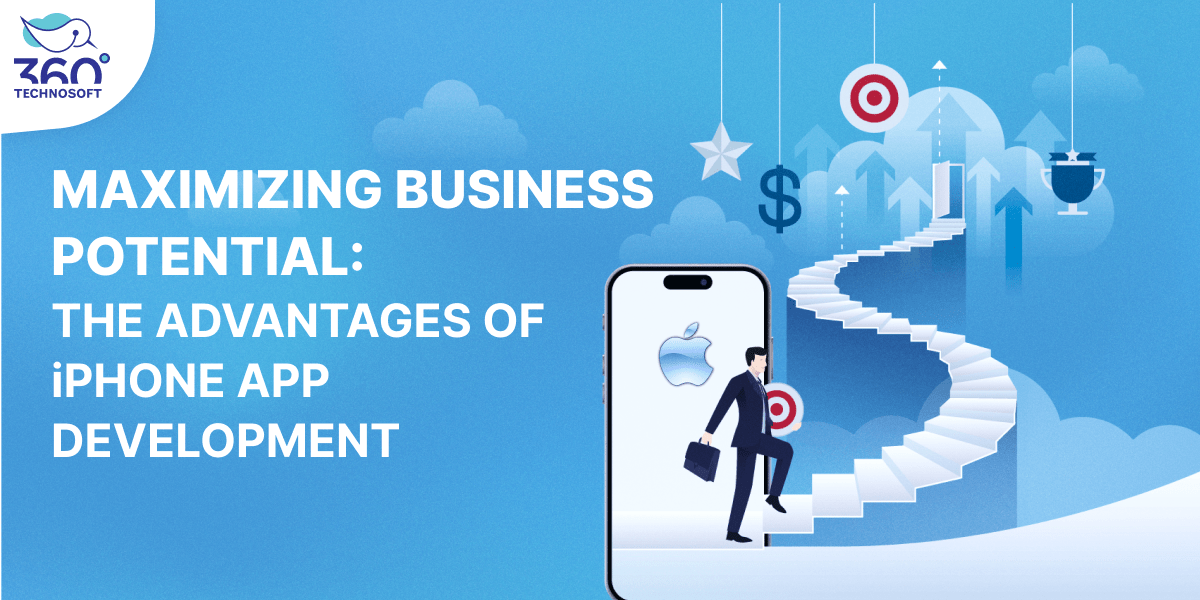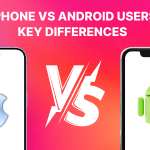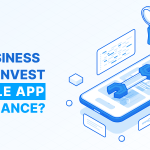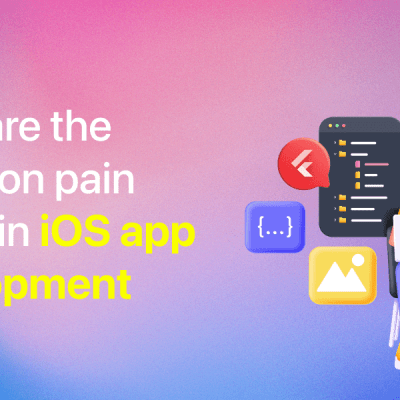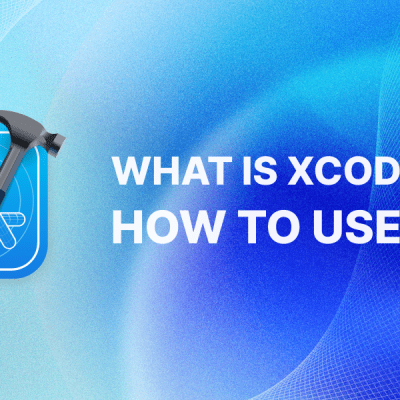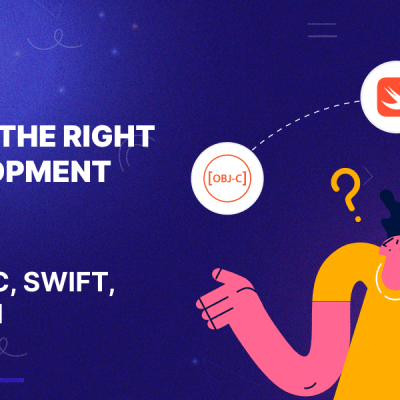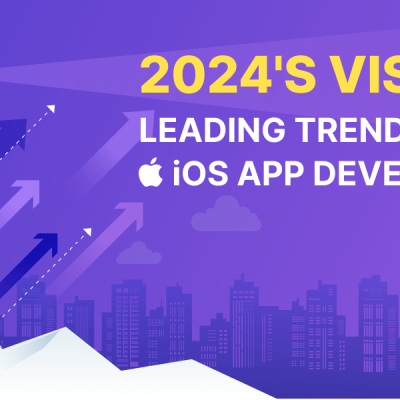It has become the need of the hour for every major business around the world to stay ahead of the game by bringing revolutionary ideas to the table. Selling quality more than quantity has become the compass for every business to navigate through the ocean of mediocrity. To acquire and provide the audience the quality you desire and the one that they deserve, iPhone app development can be one of the ways to go about it.
iPhone application development is one of the best investments business owners can make for their company. It enhances brand visibility, improves growth and profit margin by miles, and streamlines operations efficiently. The world of iOS app development is vast and versatile. Let’s understand it better by diving into the multifarious aspects of what makes iPhone app development so great for businesses. However, before we do that, let’s take a look at what the facts and statistics have to say about the state of mobile technology in the world.
Impact of Mobile Apps on Business Growth
According to Statista, 2021 saw 7.1 billion mobile users worldwide, which increased to 7.26 billion in 2022. This number kept growing this year as well, standing tall at 7.33 billion users. 2025 is projected to account for 7.49 billion mobile users around the world.
The number of mobile devices turned on in 2021 was recorded to be around 15 billion which was an upgrade since the year preceding that which held 14 billion. Availability of mobile devices around the world is projected to reach 18.22 billion by 2025 which represents a massive surge in mobile usage around the world since 2020. [ Source Statista ]
Case Studies of Successful Businesses through Mobile Apps
Airbnb
Airbnb initially faced the problem of being unable to connect their customers with hosts in a smooth way. Ever since then, it invested exponentially in the software development of its app to make it more user-friendly and intuitive. This development contained features for property listings, user reviews, and secure and safe payments.
Uber
Uber caused a massive upset for traditional taxi services by connecting riders to drivers and having a real-time and location-based solution. Hence, Uber became as big as it is today since it utilizes complicated algorithms for navigation, ride matching, and pricing. The app gradually keeps on evolving and updating.
Slack
Slack allows room for improvement when it comes to workplace collaboration and communication going up against equally eligible players in the market. One of the reasons why it is a tycoon in the market is due to its robust, user-friendly platform that allows chatting options with third-party integrations. The platform now focuses on real-time messaging, file sharing, and search capabilities.
iOS Goldmine for Business Triumph
iOS holds the forefront when it comes to the mobile market in the USA. However, it does not dominate the world market in terms of popularity and user preference. iOS claims more than half of the mobile market until July 2023. In 3Q23, Apple maintained its lead in global wearable sales, securing a 20.2% market share. Nevertheless, IDC reports a 26.7% year-over-year decline in sales for AirPods and Apple Watches. According to the research group, Apple’s total wearable device sales reached 40.8 million units, contributing to a 28.2% market share in Q3202.
Top Mobile Operating Systems
In September 2022, iOS 16 made its debut, followed by Android 13 in August of the same year. A notable contrast lies in their hardware compatibility – iOS exclusively runs on Apple devices, whereas Android spans a variety of manufacturers like Samsung, Google, and OnePlus. Apple boasts a higher success rate in updating its users; as of February 2023, a solid 81% of iOS users had embraced iOS 16. In contrast, by January 2023, just a quarter of Android users had transitioned to the latest Android version.
A Comparative Study of iOS and Android
| Factors | iOS | Android |
|---|---|---|
| Programming Languages and Development Tools | Swift, Objective-C, Xcode | Java, Kotlin, Android Studio |
| App Design and User Interface Guidelines | Human Interface Guidelines (HIG) | Material Design Guidelines |
| App Store and Distribution Process | App Store | Google Play Store |
| Security and Privacy Considerations | Strong emphasis on security and privacy | Open-source nature may introduce some security concerns |
| Cost Considerations | Expensive to develop and publish apps | Cheaper development and publishing options |
| Hardware and Device Fragmentation | Limited hardware options (Apple devices) | Wide range of devices with different screen sizes and resolutions |
| Development Complexities | Requires compliance with strict guidelines | More flexible development options |
| Integration and Compatibility | Tight integration with the Apple ecosystem | Greater integration with third-party platforms |
| Revenue Generation and Monetization Options | Higher revenue potential through app sales | Multiple monetization options (ads, in-app purchases, etc.) |
The choice between iOS and Android involves a multifaceted decision-making process. While iOS excels in a secure and integrated ecosystem, offering higher revenue potential through app sales, it comes with a higher development cost. On the other hand, Android provides more flexibility, and diverse monetization options, and accommodates a wide range of devices, but its open-source nature introduces security considerations. The decision ultimately boils down to individual priorities, development preferences, and the targeted audience, with each platform presenting a unique set of advantages and trade-offs for app creators and businesses.
Benefits of iPhone App Development
High App Revenue
It has been established that iOS apps generate better app revenue than Android OS. This higher ROI is a consequence of improving the mistakes, errors, tips, and tricks along with other related information in the operating system. The scalable iOS apps lead a company towards healthier finances and higher revenues. They are also capable of attracting investors and expanding the reach of the brand to wider audiences around the world.
Enterprise Data Security
Data security in Android apps has been a major concern for multiple reasons. Such data breach is harmful not only to the company but also to its clients. If you compare iPhone vs Android based on their data security, the iPhone is deemed as the better choice since it evaluates the data entering the device through stringent standards like:
- Integrated data management systems.
- Precautions to prevent data duplication.
- Data encryption eliminates any security concerns within the software.
As a result, hackers always have a hard time breaching the security measures of the iPhone over Android.
High-Quality Standards
As we established above, the evaluation for an iPhone app to be released on the App Store is rather strict. Bypassing these standards, the user is assured of the app’s seamless functionality and the quality it brings. They also guarantee amazing performance and flawless experience. Such impeccable standards and quality have gained Apple much trust and satisfaction from their audience which has resulted in such a large and loyal customer base.
Android, on the other hand, follows a non-generalized method to develop an app and dig deep into open-source libraries. This creates room for arbitrarily good user experiences in some devices and unsatisfactory in others. The iPhone on the other hand sticks to a single approach and provides the same UX across all devices.
Furthermore, the time taken to develop an Android app is much longer than developing an iPhone app while ios app development cost is more. As a result, businesses outsource their Android app development projects to the lowest bidder that can deliver an above-average product. The iPhone on the other hand scrutinizes every product before releasing it into the market highlighting its quality standards.
Apps for all business needs
All brands and businesses need to understand the significance of a well-functioning app for their business to grow. Clients expect responsiveness and fluidity from their business deals which is why iPhone app development is in such demand. Mobile apps allow owners to stay connected with their consumers and remain in touch every moment.
iPhone apps provide off-the-shelf as well as custom-made solutions that can cater to all business requirements. Even though iPhone app development requires a higher budget than usual, businesses gravitate more towards it due to its guaranteed company growth and enhanced market reach.
Loyal Customer Base
Apple’s customer base is one USP that can also be a huge benefit for their potential clients. Even though Android might dominate market share globally, the iPhone makes its place in specific regions and garners a niche of clients that expect quality standards and performance from its services. Rarely do users try the iOS for the first time, and convert to another OS. Android, on the other hand, has too many competitors in this market to compete with.
Exceptional User Experience
The iPhone app experience offers its users seamless functionality that is more than satisfactory for the majority of its users. Acute harmony between the hardware and software components of the iPhone apps makes them a perfect fit for businesses of all kinds. Furthermore, consistent customer support and maintenance elevate the experience even further while using the app. This becomes one of the best add-on iOS advantages for users.
Tech-Savvy Audience
iPhone users are magisterial when it comes to understanding technology and innovation. Hence, there is a certain standard of innovation expected from their consumer base. This allows businesses to be creative in their approach and develop multiple complex applications that become trendsetters in the market. Businesses investing in better innovative iPhone apps tend to stay ahead of the competition against others.
Testing Simplicity and Low Fragmentation
Apple updates just once every year for their existing OS due to the scarcity of their devices compared to Android ones. Consequently, Android apps require constant updates for multiple variations and apps they release in the market. Apple, on the other hand, has to meet the updating criteria of their most prevalent iOS versions in the market for maintenance. As a result, the time to develop an iPhone app is reduced severely, and is released earlier than Android apps which is why businesses prefer the former to the latter.
High fragmentation can be witnessed in the Android market as only 10.4% of the users utilize the latest version. The rest are still fixated on the three-year-old versions of their device. This creates multiple problems for businesses. They have to streamline their apps based on all the versions of Android to gain a consumer base. This, as a result, requires a much larger budget for app development.
Apple entertains a more consolidated market as 81% of its user base utilizes iOS 16. This amounts to low fragmentation which is perfect for businesses to capitalize on. This is why businesses turn towards iPhone app development for their companies.
Due to low fragmentation, scalability in the apps increases and every year Apple introduces better features to upscale the existing apps.
Market Dominance
In developed markets, Apple does brilliantly well. These markets can be found in the US and the UK where iOS has simply taken over the business industries. Investing in iOS apps in these markets can be considered a winning strategy. The legacy and impact of Apple in these countries will offer you enough incentive to build a successful business implementing iOS apps. Google is still far behind when it comes to dominating the app market. With millions of new apps, Android struggles a lot to keep up with its competitors. The chances of your business being unsuccessful are quite high despite investing big time in the Android app market.
Quicker Development Time
Android apps take more time to develop than iOS apps. It takes 28% less time to develop an iOS app constituting the same specifications. This is because Android apps are evaluated across multiple devices before they are declared eligible for the market. These devices contain different resolutions, OS versions, and screen sizes. This is why they take so much time to be released. The location and payment of the Android app development process also varies from place to place.
iPhone apps assure businesses with market visibility, customer satisfaction and loyalty, and profitability. Additional features include low production costs, low app development duration, and affordable maintenance makes this choice lucrative for businesses. Apple helps multiple businesses to establish their name in the market due to its legacy and brand recognition. This makes it all the more worthwhile to invest in iPhone app development.
Simple Interface
In the business world, the iPhone is notorious for offering its users the best UI/UX that improves the app’s user engagement. This implies that by choosing an iPhone you can attract more and more users. The sales of a company are increased once users begin to assimilate their product. Additionally, iOS apps evolve and help in your business’ growth which is why it results in increased ROI.
Secured Transactions
iPhone apps provide a safe and secure platform for its users to perform online transactions seamlessly. iOS apps designed for business are hardwired with advances and secure features that shield the operating system from threats such as phishing and hacking. These apps ensure that online transactions are completely encrypted.
Conclusion
Now that you understand the benefits of iOS app development in the business world, it is important to pick the right app development agency/company to deliver you a functional mobile app. Make sure to tell them the mission and vision of your business so that it becomes easier for both parties to work together efficiently and streamline your app considering your business goals.
These benefits are the reason why iOS app development, with such little impact in the majority of the world, seems the right choice for so many companies. This is because it is not just the public opinion that matters but also the services that a platform provides and its ability to handle any technical issues and errors.
Frequently Asked Questions (FAQ)
1. What are the main programming languages used for iPhone app development?
Apple’s official programming language is Swift which is responsible for the majority of the iPhone app development. Another famous programming language that was prevalent before Swift came into action is Objective-C. Despite Swift being the prevailing language, Objective-C is still quite relevant these days.
2. What makes iPhone app development more expensive than other platforms?
The stringent evaluation process along with state-of-the-art features are some of the reasons why iPhone app development is so expensive. Passing the App Store evaluation implies that the app is of flawless quality and performance.
3. How does iPhone app development implement monetization strategies?
The App Store offers a lucrative platform for businesses to make money via approaches such as in-app purchases, subscriptions, and app sales, that provide diverse monetization platforms for a business to invest in.
4. Is it a good idea for a business to launch their iOS app in different languages?
Absolutely. There is no harm done in releasing an app in multiple languages. Multilingual capabilities enhance accessibility, allow businesses to access various global markets, and increase the consumer base. This can help in maximizing your business potential.
